|
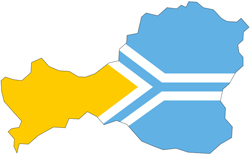 On January 12, the head of Tuva, Sholban Kara-ool started off a new project. The newspaper will now tell you about the contest “Nine Treasures of Tuva” (Tos Ertine) in more detail. Our correspondent’s questions are answered by the adviser of the Chairman of RT, Dina Oyun. On January 12, the head of Tuva, Sholban Kara-ool started off a new project. The newspaper will now tell you about the contest “Nine Treasures of Tuva” (Tos Ertine) in more detail. Our correspondent’s questions are answered by the adviser of the Chairman of RT, Dina Oyun.
— Let’s start with the fact that this is not really a competition, but a project. What is so special about it?
— It is wider in scope than an ordinary contest, and it is mostly aimed at all the people of Tuva. Its goal is not so much to find the best, as to discover the most interesting, unique, idiosyncratic stuff in our republic, to awaken the activity of the people, their basic curiosity, the desire to search and to find wonders in their own native area, district, or city. We were so lucky to be born in a unique place, a treasure-house of history. Natural landscapes so rare in their variety, and the culture of the people so rich in traditions, bring thousands of tourists from the whole world here, to the center of Asia. And we often discover our Tuva, its interesting and noteworthy phenomena, through their eyes.
Americans, for example, do not have this and they literally, in an empty spot, build some artificial relic and then present it as something unique. We do not have to think up anything, everything is already here – right next to us.
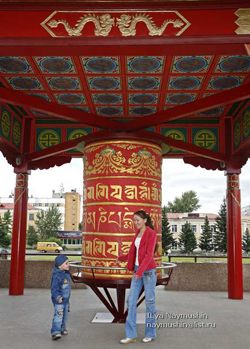 But we often take it for granted, do not value it and do not take good care of it. Take, for example, Dus-Khol and Khadyn everybody is aware of their amazing healing qualities. And what happens on the shores of these lakes in the summer? They turn into a garbage dump. And that is done not by somebody else, but by us, the people of this republic. And at the same time, these lakes are our treasures. So, along with the noteworthy things that everybody knows about, project “Tos Ertine” is expected to discover dozens of great and small wonders, that only a few individuals know about. The tree that is twisted into a knot, which Vladimir Putin liked so much when he came to Tuva for his vacation, is now known throughout the world because of that great photograph. But where is it? Sholban Kara-ool told the journalists about this curiosity at the meeting with them. And at the end of the year, we will, out of such unique “treasures”, and there could be 100-200 of them , compose a map of noteworthy tourist sites of Tuva. Tour itineraries will be worked out. The articles and video material of the participants of the contest will be published in a book and DVD album about “Nine Treasures of Tuva”, which will be released for the finale of the Year of Tourism. But we often take it for granted, do not value it and do not take good care of it. Take, for example, Dus-Khol and Khadyn everybody is aware of their amazing healing qualities. And what happens on the shores of these lakes in the summer? They turn into a garbage dump. And that is done not by somebody else, but by us, the people of this republic. And at the same time, these lakes are our treasures. So, along with the noteworthy things that everybody knows about, project “Tos Ertine” is expected to discover dozens of great and small wonders, that only a few individuals know about. The tree that is twisted into a knot, which Vladimir Putin liked so much when he came to Tuva for his vacation, is now known throughout the world because of that great photograph. But where is it? Sholban Kara-ool told the journalists about this curiosity at the meeting with them. And at the end of the year, we will, out of such unique “treasures”, and there could be 100-200 of them , compose a map of noteworthy tourist sites of Tuva. Tour itineraries will be worked out. The articles and video material of the participants of the contest will be published in a book and DVD album about “Nine Treasures of Tuva”, which will be released for the finale of the Year of Tourism.
—
And isn’t it possible to enter other things than actual geographical spots on the map?
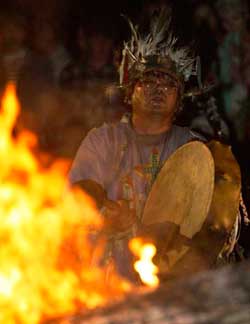 — Of course. Our respected writer, doctor of historical sciences, Mongush Borakhovich Kenin-Lopsan, who will be the scholar-curator of this project, suggested, for example, his variant of treasures. It is shamanism, Tuvan language, the village Khondergei, native place of the founder of the circus dynasty, Vladimir Oskal-ool, and the heroic machine-gunner of the Great Patriotic War, Sat Burzekei. Plus Kungurtug, where the museum expedition found, in one of the caves, a chest with Buddhist mantras of the “Greatest wisdom”…I think that the new entries for the contest will surprise both of us again and again. — Of course. Our respected writer, doctor of historical sciences, Mongush Borakhovich Kenin-Lopsan, who will be the scholar-curator of this project, suggested, for example, his variant of treasures. It is shamanism, Tuvan language, the village Khondergei, native place of the founder of the circus dynasty, Vladimir Oskal-ool, and the heroic machine-gunner of the Great Patriotic War, Sat Burzekei. Plus Kungurtug, where the museum expedition found, in one of the caves, a chest with Buddhist mantras of the “Greatest wisdom”…I think that the new entries for the contest will surprise both of us again and again.
—
What is the plan of organization of the first stage?
— The collection of the entries will take place until March 15, and anybody can express themselves. Discoveries of unique natural objects, historical and cultural monuments, other local noteworthy objects, submitted in any form, will be accepted at the e-mail address tosertine@yandex.ru or at the address: 667000, ul. Chulduma, 18, with a note “For the “Nine Treasures” contest”. The packet of documents should contain a description of the object: location, short historical summary, reason why this object is considered interesting, legends and traditions. Special mailboxes will be placed in all the post office departments of the republic as well, and it will be possible to send in the entries in this way. From March 15 to April 1, the systematization of all the entries will take place, and it will be possible to learn about them on the official site. Afterwards, several sections of the project will start at the same time, which should increase the numbers of the participants.
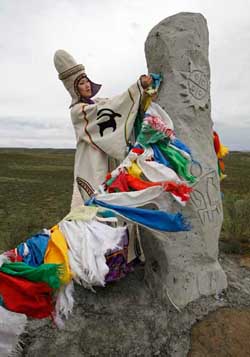 For example, entrepreneurs can come up with offers to set up and arrange a chosen tourist object, and we expect similar initiative from the local population or local administrations, work collectives. We already have an established practice of national group building of suburgans, work groups – like the clean-up of the spring “Bobry”, why should the noteworthy objects not be arranged and cleaned up for presentation in this way? A contest of journalist excellence will also start at this time, in which, based on the entries, will generate more material. The entire summer period will involve both the setting up of the objects and arranging the whole chain for tourist attractiveness. In this, again, is a lot of potential for journalist work-up: to find the people, to show the active population, which is trying to arrange these places so that they could enter into the project registry. Plus the tour companies. There is also a lot of room for initiative: to work out the tour itineraries which include the “treasures”. We would like to be understood that all this is not being done not as much for those who come to Tuva, as for us ourselves. We have to bring back the former attitude to regional expertise, so that we can start to discover Tuva for ourselves, to travel around the republic. And so that the necessary infrastructure would be built: normal tour itineraries set up in such a way that there would be places to spend the night and to have a meal. We need the tourist excursion bureau to get to work: start with Kyzyl, then encompass the whole republic. It would be good for the capital city: if only we could discover the old Kyzyl to our contemporaries, with its rich history. But so far we can’t even show the petroglyphs on the right bank of Yenisei: the entire area is swamped with garbage. For example, entrepreneurs can come up with offers to set up and arrange a chosen tourist object, and we expect similar initiative from the local population or local administrations, work collectives. We already have an established practice of national group building of suburgans, work groups – like the clean-up of the spring “Bobry”, why should the noteworthy objects not be arranged and cleaned up for presentation in this way? A contest of journalist excellence will also start at this time, in which, based on the entries, will generate more material. The entire summer period will involve both the setting up of the objects and arranging the whole chain for tourist attractiveness. In this, again, is a lot of potential for journalist work-up: to find the people, to show the active population, which is trying to arrange these places so that they could enter into the project registry. Plus the tour companies. There is also a lot of room for initiative: to work out the tour itineraries which include the “treasures”. We would like to be understood that all this is not being done not as much for those who come to Tuva, as for us ourselves. We have to bring back the former attitude to regional expertise, so that we can start to discover Tuva for ourselves, to travel around the republic. And so that the necessary infrastructure would be built: normal tour itineraries set up in such a way that there would be places to spend the night and to have a meal. We need the tourist excursion bureau to get to work: start with Kyzyl, then encompass the whole republic. It would be good for the capital city: if only we could discover the old Kyzyl to our contemporaries, with its rich history. But so far we can’t even show the petroglyphs on the right bank of Yenisei: the entire area is swamped with garbage.
—
And what about the following stages of the project?
— In September, there will be Internet and SMS voting on the entered objects. Based on the results, a rating of our noteworthy objects will be created; they will then be published in a book and DVD album. Awards will be presented to those most keen, talented and involved.
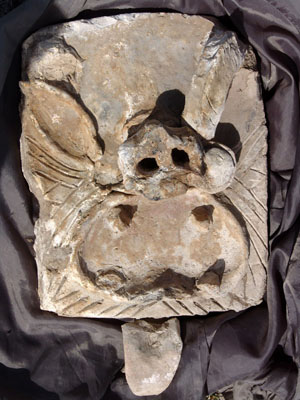 —
And the possibility of being included in the book and on the DVD are not the only incentives, are they? —
And the possibility of being included in the book and on the DVD are not the only incentives, are they?
— Material awards are also planned. The first 30 “discoverers” will receive memorial souvenirs. Creating production of these souvenirs is another of associated tasks of the project. Second, there will be recognition for: those who submit the most original entry, active journalists, and, naturally, the most active collectives working on the arrangements of the tourist attractions: entrepreneurs, population of the villages, groups of friends, collectives, and local administrations.
All the participants who will submit entries will be listed in the book.
But the project also has an economic component. And that, certainly, is what all the fuss is about.
Yes, all this is only the beginning of what we have in mind. We would like this work to serve as a push for the main part of the project, so that it would gain economic significance. Every country strives to make tourism one of the sources of income for their budget. We do not have to go far for an example – look at Mongolia, they already have a substantial start. You come there, and right away you see a multitude of little yurts – these are small tourist firms. They welcome you, feed you, give you something to drink, and invite you to come back. We do not have anything like that yet.
As a result of the realization of this project we will have to start building such an infrastructure in tourism, so that everything would be in working order not just to accept a single group of guests, but it would be in constant readiness. Guests come, and we already know where to take them, because we are confident that they will be safe, because they will be following the officially designed itineraries, and will be accompanied by an official guide, who will be responsible for them.
Tourist business has to come out of the shade, taxes need to be paid into the local budget, so that there would be a real economic gain from the development of tourism. The project includes also a search for such competent people in each district, around whom the tourist business can be established.
|
|
